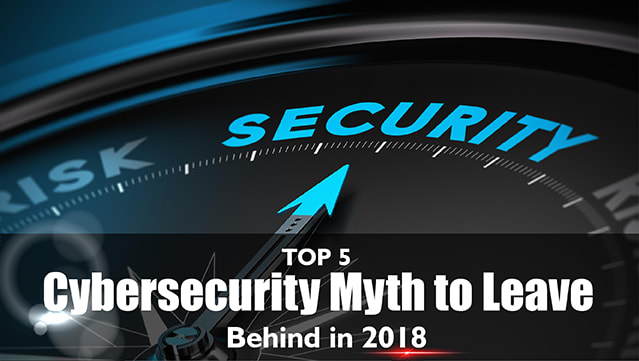The post Top 5 Cybersecurity Myth To Leave Behind In 2018 appeared first on .
Cybersecurity is always a pressing issue for the companies. Today irrespective of the sector data is the life and blood of all the industries. A huge amount of data are being stored and their security is always a prime concern for the companies.
There is no denying that there is always a risk of high profile data breaches and that poses a great threat to any kind of negligence if made. It is even more alarming that still many organizations are holding on to outdated data security myths. Especially the small to medium size business enterprises which are still dwelling in the darkness of security threats due to the scarcity of resources which can help them to overcome the web security issues.
With the growing data security technologies , the hackers too are coming up with much developed and sophisticated approach and technologies which are able to adapt to the better methods to compromise the web securities to steal information. That is why it is even more important for the business owners to keep pace with the defending technologies for their data and must be informed about the various combative actions in order to keep up with the persistent hackers.
There are top 5 security myths that certainly needs to be left behind for the year 2018.
1. Small businesses are immune to hacking
In the world of data security, no business is free from hacking. Hence it is just a myth that data security breaches will affect only the big size companies. Based on a research report done by IBM almost 62% of all cyber-attacks are aimed at the small and medium-size businesses. It is easier to target the small business websites are they are not that well protected as compared to the large size companies. According to some source, 60% of the small size companies run out of business within 6 months after they are hacked.
2. Strong password protection
Creating a password should be very well though. People who don’t pay much heed while creating their password are always under the threat of hackers. If they use simple passwords for all the accounts that they use, then they become vulnerable to the external attacks where the hackers are on a constant lookout to guess different passwords until they reach the correct one. So if the hacker manages to guess the password for one account and if the same password is used for various other accounts by the site owner then it can really prove fatal from data security standpoint.
3. Don’t rely entirely on firewall and antivirus software
Although firewall and antivirus software is important for the basic site security, however, they should not be used as the only defensive tool from the hackers. With the kind of sophisticated methods that the hackers are coming up these days, they can easily move around the firewalls and antivirus software without even being detected. Hence it is advisable for the site owners to invest in software that prevents data loss and encryption to enhance the security of their site. They should always keep updating their security software and have backups of their site on regular basis.
4. Employees can pose a threat to the network or website security
Whether intentional or unintentional even the employees can pose a threat to the internal network security. Hence it is essential for the company to properly train and make the employees aware of the data protection policies. This will help them understand the consequences of clicking on the suspicious links or a spam email.
5. Security through anonymity
Security through anonymity is the method to hide all the vulnerabilities in a system, thereby making it difficult for the hackers to access the site. For instance, the site owner can keep changing the name of an important file to something more generic thus disguising this file so that it is hard to be found, however, if the hacker is experienced then it will be able to gain entry.
- IT Services | IT Consulting and Products Company | Wenso Solutions







Top comments (1)
Thanks for bringing up these important topics! <3
I do not recall anywhere saying or people claiming that small/medium sized businesses are immune to hacking. Could you cite any materials? But I get the general idea that the myth is small/medium businesses are not as much of a target as big businesses.
What do you mean by "Strong Password Protection"? What's a myth about that? Sorry, just a little confused by the title used there. A way to solve this issue is with a diceware generated passphrase to protect a password manager such as KeePassXC or BitWarden.
It is good to have firewalls and anti-virus software, I agree. However usually there are other defenses in place. Such as Intrusion Detection System (IDS) which is protecting against "moving around without being detected" issues. If you are running a website or anything related to file uploads, you can use the system command line to automatically use scanning tools against upload files and detect if they are malicious. This is actually very practical for images, like for profile pictures. A good defense is a firewall, anti-virus, IDS, automatic security updates and encrypted backups.
Yes, it is excellent to teach your employees about information security best practices. I'll share a great article that was written on this very site.
Phishing my company. An infosec lesson for businesses
Browser
It is not known by "security through anonymity" and I do not think the word anonymity belongs there. Anonymity refers to individuals being indistinguishable, that is not the case here. Generally it's know as "security through obscurity". Overall, AVOID IT! It gives a false sense of security and buys you only a sliver of time, if at all. It can complicate things, and if things get complicated it becomes difficult to maintain security.